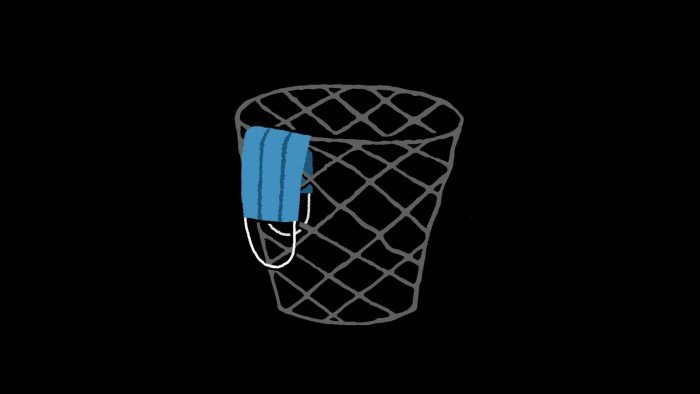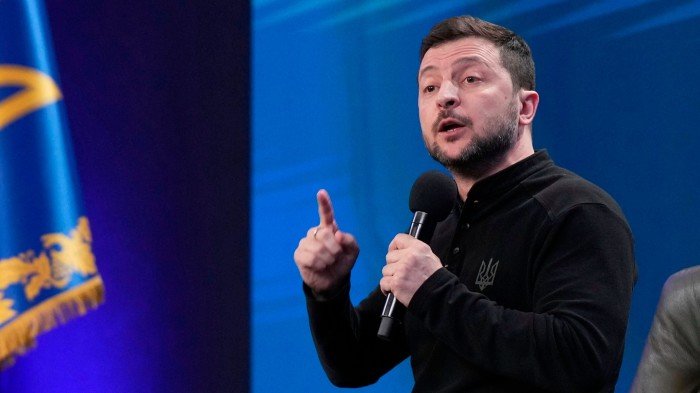When we politicise everything we make society stupider

Unlock the Editor’s Digest for free
Roula Khalaf, Editor of the FT, selects her favourite stories in this weekly newsletter.
In August 2021, a video of Democratic congresswoman Alexandria Ocasio-Cortez putting on a face mask on the steps of the US Capitol went viral. You might be surprised to hear that what was then such a common sight would draw much attention, but the problem was that Ocasio-Cortez had been filmed happily chatting to a large group of people without a mask on until it was time to pose for a picture. “Of course!” the conservative media outlet Breitbart tweeted, gleefully, along with the video.
By then, the face mask had become a powerful political symbol, and nowhere was this more the case than in America. For the left, wearing a mask meant you were a sensible, community-minded liberal; for the right, that you were a virtue-signalling, communist-adjacent member of the hypocritical coastal elite.
Some businesses, in places such as Kentucky, wouldn’t let you on to their premises if you were wearing a mask; others, in cities like New York, wouldn’t let you in if you weren’t. I recall being on the phone to a friend living in Brooklyn in the summer of 2021 who was mortified that, on a stiflingly hot day, she had accidentally taken a few steps outside her apartment without her mask on. It wasn’t that she believed she might be at risk of spreading Covid; it was that it was socially unacceptable not to be masked at all times in public.
These days, though, all that has been abandoned. The mask has been consigned to the rubbish bin of no-longer-expedient political imagery. I remember newspaper articles during the pandemic suggesting that mask-wearing — and other measures taken to try to stop the spread of viruses — might become a feature of cold and flu season now that we had got used to them, but that has not happened.
Quite the opposite, in fact — in London, it is very rare, now, to see anyone wearing a mask in public. My Stateside friends tell me that sometimes servers (who are often not given sick pay if they fall ill) wear them, but it is very unusual to see them otherwise. So politicised has mask-wearing become that even liberals don’t appear to want to wear them, in case they are seen as merely virtue-signalling (a practice that is itself quickly going out of fashion).
I have been thinking about this in recent weeks as I have slowly been recovering from the worst virus (including my four times with Covid) I can recall having. A high fever for 72 hours; a week of barely being able to get out of bed; a very persistent cough; a strange itchy post-viral rash. I’m not the only one: many of my otherwise healthy friends, colleagues and family members have over the past few months described being struck down with a particularly aggressive flu. There were so many critical incidents in UK hospitals at the start of the year that there was talk of a “flu crisis”. Health officials last month said they expected this flu season to have been “one of the worst” on record.
Would things have been better had some people decided to wear a mask in public spaces when infectious? It’s hard to know — there is still disagreement on the effectiveness of masks. From what I’ve read and understood of the way respiratory viruses work, I reckon they probably would have helped, at least a bit.
Whether or not you agree is probably strongly influenced by your politics, along with your views on vaccines, lockdowns and all sorts of non-pandemic-related culture war flashpoints such as DEI, whether or not Joe Biden was capable of serving another four years as president, and even now, God help us, who is to blame for the war in Ukraine.
And this is the problem with a culture of hyper-politicisation: we lose our ability to see things at face value, to judge policies and ideas on the basis of how useful they are. Instead, our perception of reality becomes obscured by whichever partisan lens we happen to be looking through. Even supposedly cold, hard economic data is skewed: there is now, for instance, a roughly five-point gulf between inflation expectations over the next year among Democrats and Republicans.
So what can we learn from all of this? We must try to resist the powerful urge to politicise everything. If you list your beliefs on your social media bio as if they were some kind of advert that you’re on the right side and that anyone who disagrees is guilty of wrongthink, you should not be surprised when the other side doubles down on their own opposing beliefs.
We have to make a choice: either we prioritise living in a prosperous, healthy, stable society, or we prioritise tribalism; we can’t have both. If we continue to choose the latter, we will keep on losing our grip of reality, and we’ll keep on getting stupider.
https://www.ft.com/__origami/service/image/v2/images/raw/https%3A%2F%2Fd1e00ek4ebabms.cloudfront.net%2Fproduction%2F8e373c2c-126b-4e27-8354-9c289cc29adf.jpg?source=next-article&fit=scale-down&quality=highest&width=700&dpr=1
2025-02-23 05:00:32





